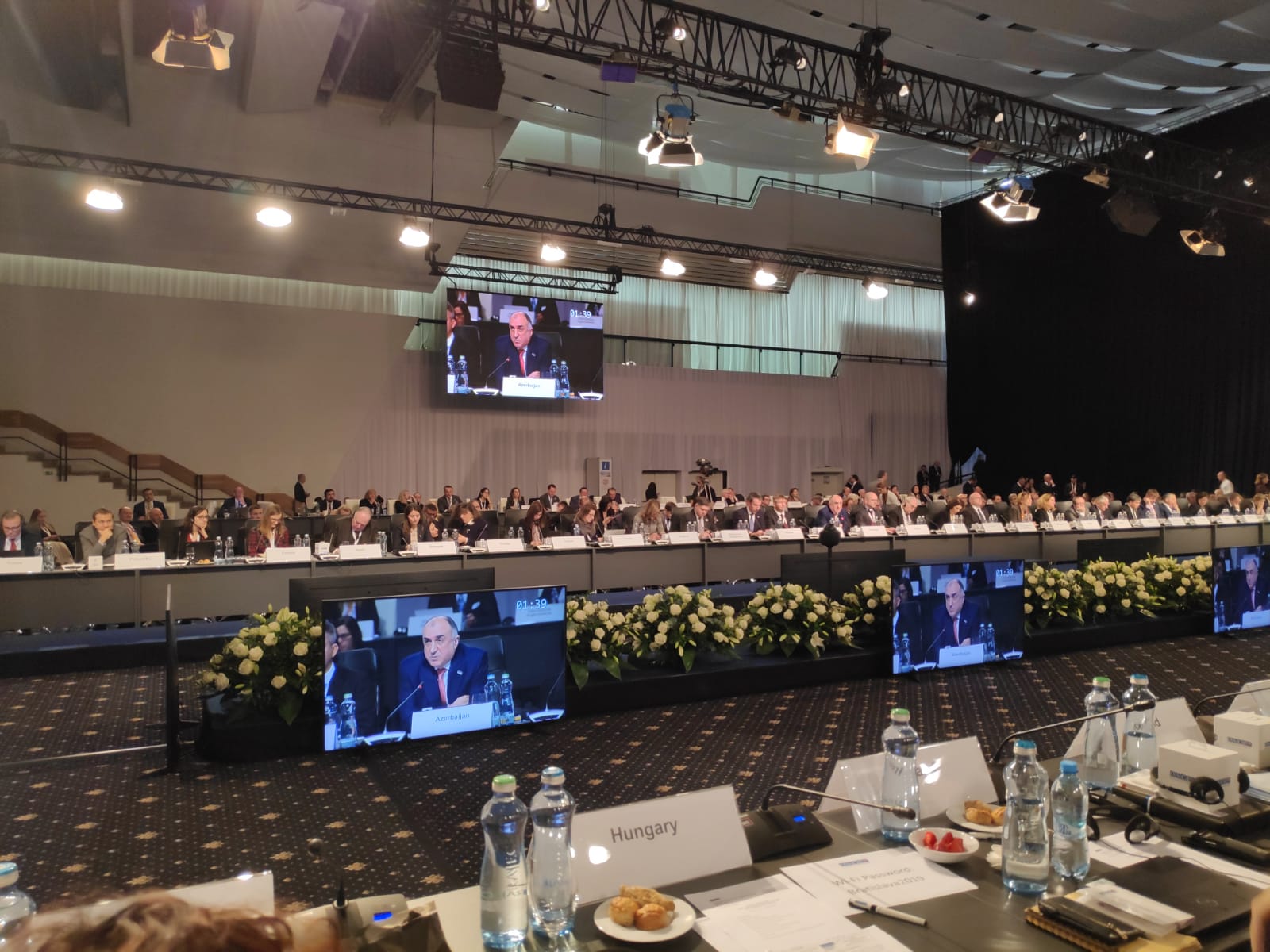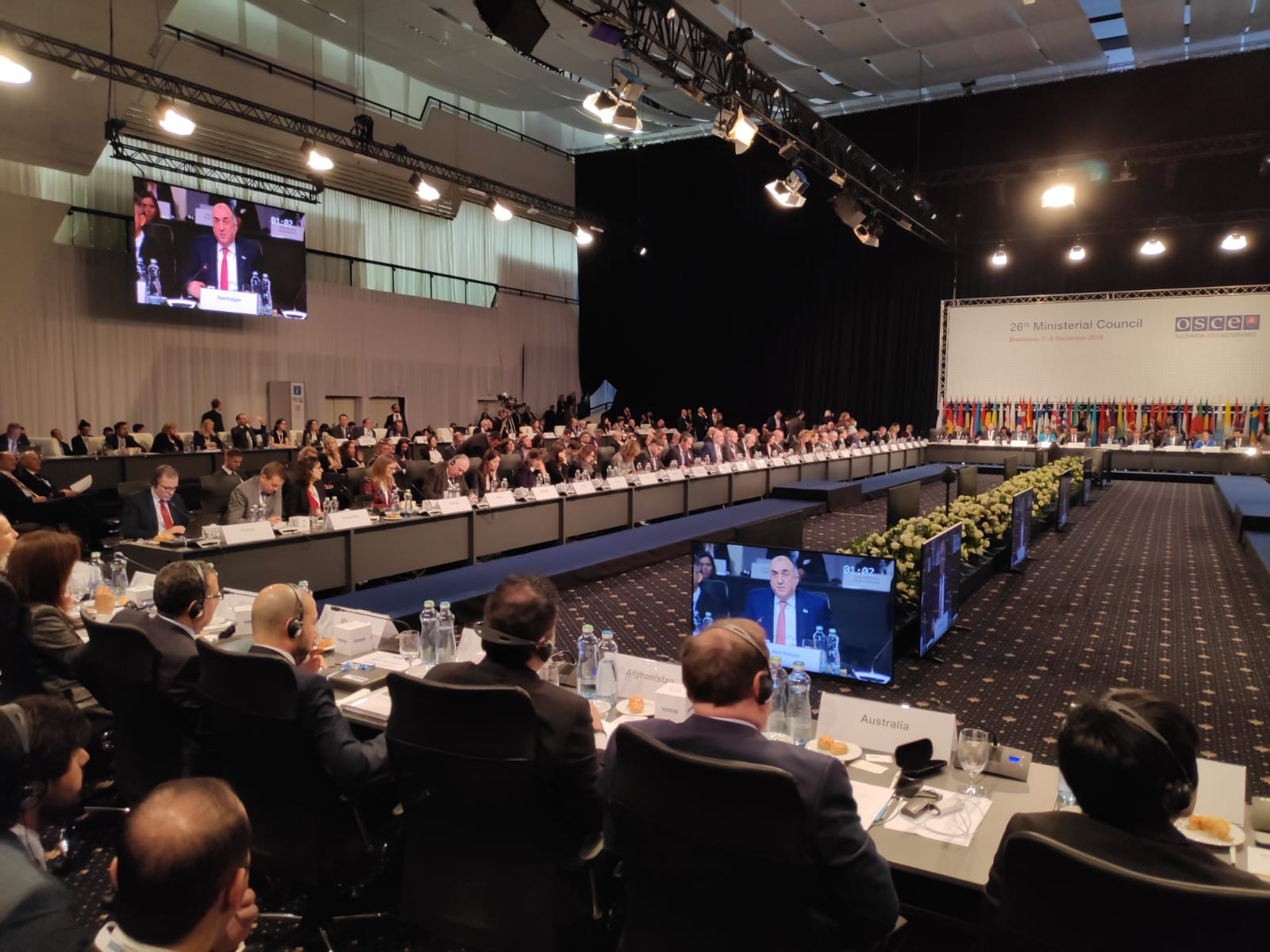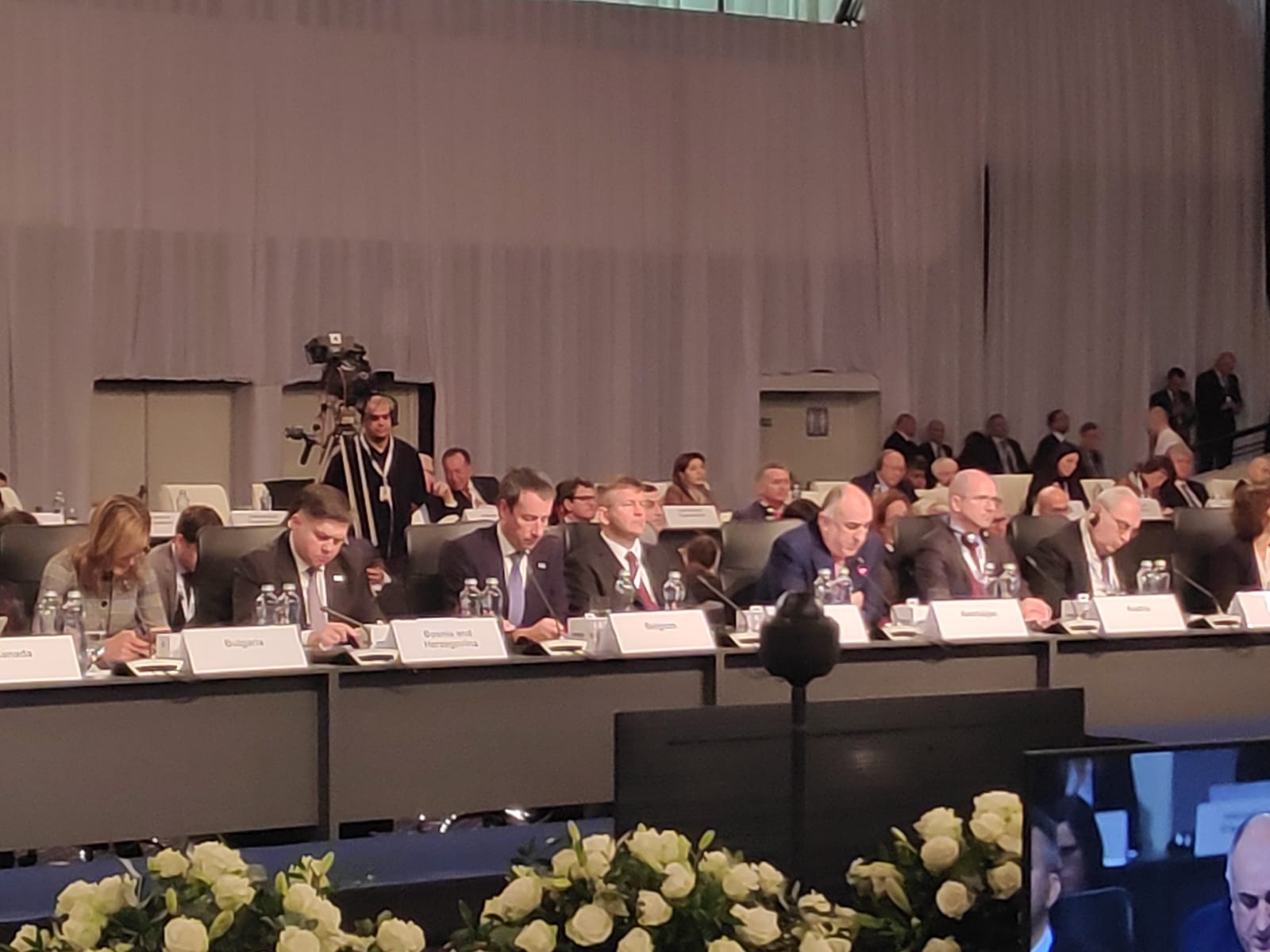No:389/19, Statement by H.E. Mr. Elmar Mammadyarov, Minister of Foreign Affairs of the Republic of Azerbaijan 26th Ministerial Council of the OSCE
Bratislava, 5-6 December 2019
At the outset, I would like to congratulate H.E. Mr. Miroslav Lajčák, the Chairperson-in- Office of the OSCE for excellent organization of the 26th Meeting of the OSCE Ministerial Council. I also wish every success to my Albanian colleague, who takes the helm of OSCE Chairmanship in 2020.
Taking this opportunity, I would like to express our gratitude to the Slovak Chairmanship for inviting the Cooperation Council of Turkic Speaking States to the OSCE Ministerial Meeting, as a guest. We firmly believe that active participation of the Turkic Council, as a comprehensive regional cooperation mechanism, in the work of the OSCE will contribute to the attainment of common goals shared by the two organizations.
Dear colleagues,
We have collectively recognized that non-compliance with international law and OSCE norms and principles lies behind the immediate causes of conflicts and ongoing crisis of pan-European security architecture. In this regard, I join the appeal of Chairman-in-Office Lajčák that the OSCE's principles and commitments are not open for re-negotiation and must remain at the core of our work to prevent conflict and foster stability for people throughout the OSCE area. Unconditional respect for the principles enshrined in the core OSCE documents starting from the Helsinki Final Act, without any exception, double standards, geographic or any other preferences must be restored. Until these double standards exist, OSCE will be far from being an effective mechanism of conflict prevention and resolution, no matter how often we pledge or adopt decisions to this end. I urge the incoming OSCE Chairmanships to work with participating States towards applying equally the OSCE principles and commitments to all armed conflicts in OSCE area. Azerbaijan also expects the mediators to support this objective as a basis for the resolution of conflicts and to act strictly in accordance with their respective mandates.
Unresolved conflicts in the territories of Azerbaijan, Georgia, Moldova and Ukraine pose a serious threat to peace and security. All these conflicts, without exception, must be resolved exclusively on the basis of the norms and principles of international law, as enshrined in the Helsinki Final Act, in full respect for the sovereignty and territorial integrity of the affected States within their internationally recognized borders.
Unfortunately, since the last Ministerial Meeting in Milan, I cannot report to the Council any tangible progress towards the resolution of the Armenia-Azerbaijan conflict. Relatively calm situation along the front line did not translate into progress in conflict resolution that would allow moving beyond the current status-quo of occupation, which Minsk Group Co-Chairmen themselves called unsustainable and unacceptable.
As a consequence of the occupation of Azerbaijani territories, hundreds of thousands of IDPs remain expelled from their homes due to the ethnic cleansing policy. In this context, I wish to highlight the case of the two of them- Dilgam Askerov and Shahbaz Guliyev, who were taken hostage by Armenia and subjected to torture and other degrading treatment. Armenia stubbornly rejects to release them, even on the basis of “all for all” principle.
Over the past year we have witnessed consistent attempts by the leadership of Armenia to derail the peace process by resorting to provocative statements and actions. The statement by Armenia’s Prime Minister that “Karabakh is Armenia. Period” runs counter to the very concept of a peaceful settlement and should be resolutely condemned.
The attempt by Armenia to change the format of negotiations established by the collectively agreed OSCE documents, in particular the Decision of the First Additional Meeting of the CSCE Council of 24 March 1992 remains an open challenge to the peace process. These documents unequivocally establish that Armenia and Azerbaijan are the two parties to the conflict, while the Azerbaijani and Armenian communities of the Nagorno-Karabakh region of Azerbaijan are the two interested parties. Attempts to portray the Armenian community as “the people of Nagorno-Karabakh” deny the very existence of the indigenous Azerbaijani community of the region and question their inalienable right to be part of a process of deciding the future of the region. Such a position aims at legitimizing the results of the ethnic cleansing, and openly contradicts the philosophy of international human rights law that all human rights are universal, indivisible, interrelated and interdependent and no one can claim for an individual or collective right at the expense of rights and freedoms of others.
Armenia continues to engage and facilitate illegal economic and other activities in the occupied territories aimed at changing physical, cultural and demographic character of those territories. According to the Global Militarization Index, Armenia is the most militarized state in the OSCE area and ranks the third globally. Armenia spends more from its GDP for military purposes than any other OSCE participating State to sustain the occupation of the Azerbaijani territories. Its illegal military activities and build-up in the occupied territories of Azerbaijan are obstacles to the settlement of the conflict and remain a source of instability in the region.
Since the last Ministerial Council, we have only managed to agree and implement certain measures in humanitarian sphere, like mutual visits of journalists from Armenia and Azerbaijan that took place two weeks ago. However, such moves cannot produce any tangible result, if the political process remains stagnated. They cannot be a substitute to substantive negotiation process.
The position of Azerbaijan towards the resolution of the conflict is consistent and is reflected in the Memorandum that was distributed among participating States at this Ministerial Council (SEC.DEL/575/19). Let me remind, that the conflict resolution process is based on a step-by-step approach. This approach has no alternative because it is based on the related UN Security Council resolutions and the OSCE decisions, in particular the Budapest Summit decision of 1994, which form the only legal framework for a political settlement of the conflict.
The first step shall be the elimination of the major consequences of the conflict, thus ensuring immediate, complete and unconditional withdrawal of the armed forces of Armenia from the Nagorno-Karabakh region and other occupied territories of Azerbaijan, to be followed by the return of the displaced Azerbaijani population to their homes and properties in safety and dignity, including into the Nagorno-Karabakh region, opening of all communications in the region for mutual use and rehabilitation and economic development of these territories.
Withdrawal of Armenian troops from Azerbaijani lands will provide a good opportunity to elaborate and define the status of self-rule for the population of the Nagorno-Karabakh region within Azerbaijan, in accordance with the Constitution and legislation of Azerbaijan. Such a status must ensure peaceful coexistence of the Armenian and Azerbaijani communities of the region and guarantee full enjoyment by all of human rights and fundamental freedoms on an equal and non-discriminatory basis.
The definition of the status shall take place in peaceful conditions through a legitimate process with direct, full and equal participation of the population of the Nagorno-Karabakh region of Azerbaijan, namely, the Armenian and Azerbaijani communities, and in their interaction with the Government of Azerbaijan exclusively in the framework of the Constitution of the Republic of Azerbaijan.
Armenia’s persistent attempt to put forward the issue of status is contrary to the decisions of OSCE endorsed by the UN Security Council resolutions and essentially is a blow to the peace process and to the mandate of the Minsk Group Co-Chairmen.
The resolution of the conflict is possible only on the basis of the sovereignty and territorial integrity of Azerbaijan within its internationally recognized borders. The military occupation of the territory of Azerbaijan does not represent a solution and will never produce a political outcome desired by Armenia.
Azerbaijan remains committed to the conflict settlement process based on this understanding.



